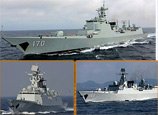
The State Council, China's cabinet, gave the green light late Wednesday to the establishment of the Chinese mainland's first free trade zone - to be centered in Shanghai on a trial basis - a development which is expected to boost the city's influence as an international financial center.
Some have already put forward concerns that this pilot free trade zone will challenge Hong Kong's status as a free global port; but such anxieties, at least at present, seem quite unfounded. The importance of the new zone, which is designed to serve as a testing ground for upgrades to China's economy, goes far beyond just elevating Shanghai's profile and thus will likely pose little threat to Hong Kong.
According to a State Council release issued late Wednesday after a meeting presided over by Premier Li Keqiang, the free trade zone will help China carve out new competitive advantages in the global market, representing a big step forward in the country's opening-up.
This process will add further momentum to the economic transformation that is currently underway in China. Through further market openness, combined with increased engagement in global competition, domestic economic restructuring will be much easier to facilitate.
Moreover, the new zone will comprise the four existing bonded areas under the special administration of customs - including the Waigaoqiao Free Trade Zone, the Waigaoqiao Bonded Logistics Zone, the Yangshan Free Trade Port and the Pudong International Airport Comprehensive Free Trade Zone - the statement said.
With no additional details currently available, I would speculate that instead of just enjoying favorable tariff policies, Shanghai's free trade zone will aim to surpass the achievements of earlier bonded zones by testing reforms designed to help China catch up with global trends.
The global financial crisis is still not over, and trade protectionism remains relatively commonplace around the world.
Meanwhile, many countries are now actively engaged in talks on regional trade agreements, such as the US-led Trans-Pacific Partnership (TPP). China, as the world's second largest economy, cannot afford to fall behind on this developing trend. Actually, the country has been following talks on the TPP, the Xinhua News Agency reported citing Foreign Ministry spokesman Hong Lei in May.
Without knowing how much of an impact more exposure to international competition will have on China, it is understandable that the central government wants to experiment with the pilot zone in Shanghai. This cautious step will help the country avoid risks down the road and gain experience in freer cross-border trading and capital flows which can later be applied elsewhere.
The article was compiled by Global Times reporter Wang Jiamei based on an interview with He Weiwen, co-director of the China-US-EU Study Center under the China Association of International Trade.
















 Man swims in flood to deliver food for pregnant wife
Man swims in flood to deliver food for pregnant wife


![]()
